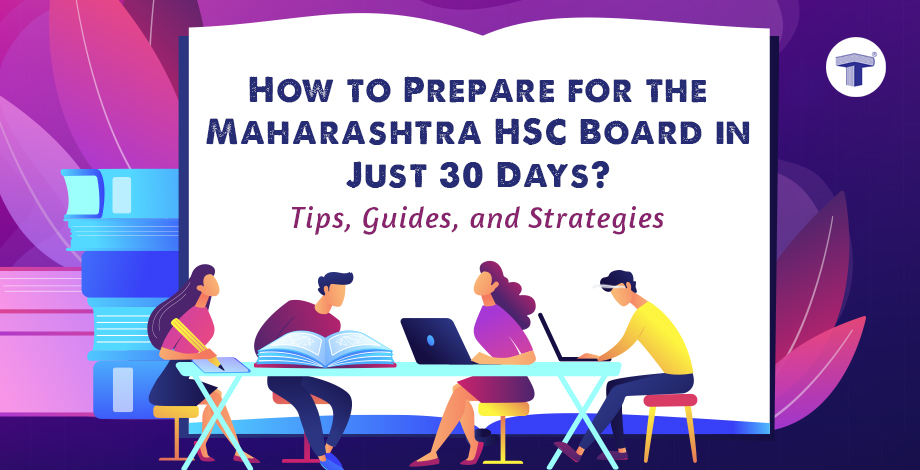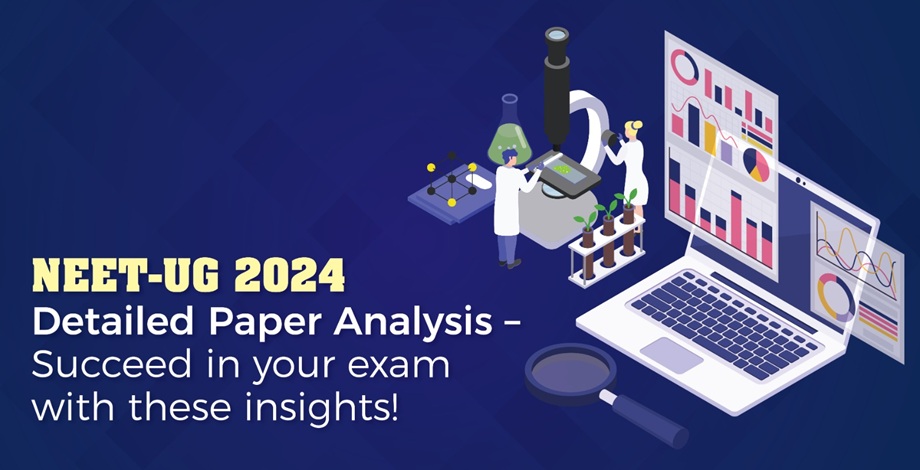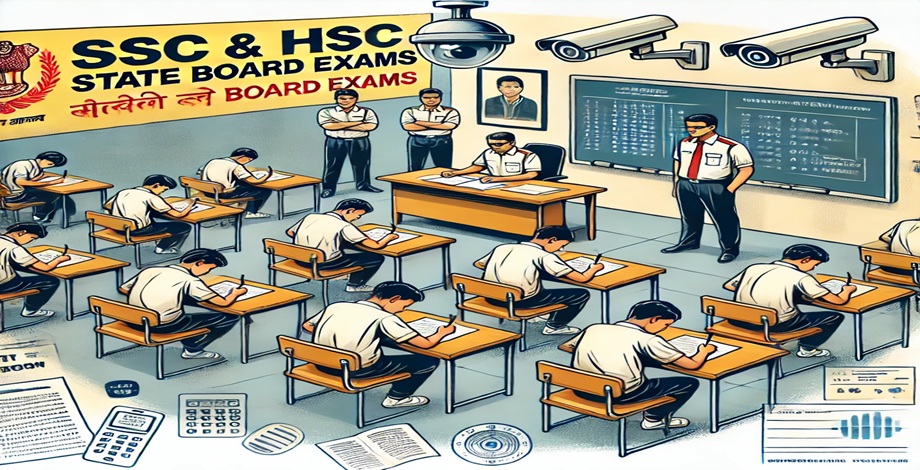Get all the latest information on Events,
Sales and Offers. Sign up for newsletter today.
How to Prepare for the 2024 Maharashtra HSC Board Within a Month: Tips, Guides, and Strategies

Are you a student of the Maharashtra State Board preparing for your 12th standard exams? With the HSC exams just a month away, it's natural to feel overwhelmed and anxious. But with right preparation and strategy, you can still ace your exams.
From the syllabus to study materials and tips for studying effectively, we’re discussing the best ways to prepare for your Maharashtra HSC exams within a month.
Understanding the HSC Syllabus
Before diving into your 12th Board exam preparation, it's crucial to have a clear understanding of the HSC syllabus. The Maharashtra State Board has a vast syllabus for standard 12th, covering various subjects such as English, Mathematics, Science, and more.
To ensure that you cover all the topics and subtopics, it's essential to have a copy of the HSC syllabus. You can easily find it on the official website of the Maharashtra State Board.
Prioritising Subjects
Once you have the syllabus, it's time to prioritise the chapters you need to cover.
Here is the chapter-wise weightage of a couple of subjects to help you set your priority:
Standard 12 Science: Subject-wise and Chapter-wise Weightage
| Sr. No. | Chapter Name | Marks with Option |
| 1 | Rotational Dynamics | 7 |
| 2 | Mechanical Properties of Fluids | 7 |
| 3 | Kinetic Theory of Gases and Radiation | 7 |
| 4 | Thermodynamics | 7 |
| 5 | Oscillations | 5 |
| 6 | Superposition of Waves | 6 |
| 7 | Waves Optics | 7 |
| 8 | Electrostatics | 6 |
| 9 | Current Electricity | 6 |
| 10 | Magnetic Fields Due to Electric Current | 6 |
| 11 | Magnetic Materials | 5 |
| 12 | Electromagnetic Induction | 7 |
| 13 | AC Circuits | 6 |
| 14 | Dual Nature of Radiation and Matter | 5 |
| 15 | Structure of Atoms and Nuclei | 6 |
| 16 | Semiconductor Devices | 5 |
| Sr. No. | Chapter Name | Marks with Option |
| 1 | Solid State | 5 |
| 2 | Solutions | 6 |
| 3 | Ionic Equilibria | 6 |
| 4 | Chemical Thermodynamics | 8 |
| 5 | Electrochemistry | 7 |
| 6 | Chemical Kinetics | 6 |
| 7 | Elements of Groups 16, 17 and 18 | 8 |
| 8 | Transition and Inner Transition Elements | 8 |
| 9 | Coordination Compounds | 7 |
| 10 | Halogen Derivatives | 7 |
| 11 | Alcohols, Phenols and Ethers | 6 |
| 12 | Aldehydes, Ketones and Carboxylic Acids | 8 |
| 13 | Amines | 4 |
| 14 | Biomolecules | 4 |
| 15 | Introduction to Polymer Chemistry | 4 |
| 16 | Green Chemistry and Nanochemistry | 4 |
| Sr. No. | Chapter Name | Marks with Option |
| 1 | Mathematical Logic | 8 |
| 2 | Matrices | 6 |
| 3 | Trigonometric Functions | 10 |
| 4 | Pair of Straight Lines | 6 |
| 5 | Vectors | 12 |
| 6 | Line and Plane | 10 |
| 7 | Linear Programming | 4 |
| 8 | Differentiation | 9 |
| 9 | Applications of Derivatives | 9 |
| 10 | Indefinite Integration | 10 |
| 11 | Definite Integration | 6 |
| 12 | Application of Definite Integration | 4 |
| 13 | Differential Equations | 8 |
| 14 | Probability Distributions | 5 |
| 15 | Binomial Distribution | 5 |
| Sr. No. | Chapter Name | Marks with Option |
| 1 | Reproduction in Lower and Higher Plants | 8 |
| 2 | Reproduction in Lower and Higher Animals | 8 |
| 3 | Inheritance and Variation | 6 |
| 4 | Molecular Basis of Inheritance | 6 |
| 5 | Origin and Evolution of Life | 6 |
| 6 | Plant Water Relation | 7 |
| 7 | Plant Growth and Mineral Nutrition | 7 |
| 8 | Respiration and Circulation | 10 |
| 9 | Control and Co-ordination | 11 |
| 10 | Human Health and Diseases | 4 |
| 11 | Enhancement of Food Production | 6 |
| 12 | Biotechnology | 7 |
| 13 | Organisms and Populations | 4 |
| 14 | Ecosystems and Energy Flow | 4 |
| 15 | Biodiversity, Conservation and Environmental Issues | 4 |
Standard 12 Commerce: Subject-wise and Chapter-wise Weightage
| Sr. No. | Chapter Name | Marks with Option |
| 1 | Introduction to Micro-economics and Macro-economics | 10 |
| 2 | Utility Analysis | 10 |
| 3A | Demand Analysis | 12 |
| 3B | Elasticity of Demand | 12 |
| 4 | Supply Analysis | 10 |
| 5 | Forms of Market | 10 |
| 6 | Index Numbers | 11 |
| 7 | National Income | 12 |
| 8 | Public Finance in India | 12 |
| 9 | Money Market and Capital Market in India | 11 |
| 10 | Foreign Trade of India | 6 |
| Sr. No. | Chapter Name | Marks with Option |
| 1 | Introduction to Corporate Finance | 25 |
| 2 | Sources of Corporate Finance | |
| 3 | Issue of Shares | |
| 4 | Issue of Debentures | 35 |
| 5 | Deposits | |
| 6 | Correspondence with Members | 18 |
| 7 | Correspondence with Debenture Holders | |
| 8 | Correspondence with Depositors | |
| 9 | Depository System | 11 |
| 10 | Dividend and Interest | 13 |
| 11 | Financial Market | 14 |
| 12 | Stock Exchange |
| Sr. No. | Chapter Name | Marks with Option |
| 1 | Principles of Management | 12 |
| 2 | Functions of Management | 15 |
| 3 | Entrepreneurship Development | 5 |
| 4 | Business Services | 27 |
| 5 | Emerging Modes of Business | 10 |
| 6 | Social Responsibilities of Business Organisations | 10 |
| 7 | Consumer Protection | 17 |
| 8 | Marketing | 20 |
| Sr. No. | Chapter Name | Problem | Objective | Problem | Objective |
| 1 | Introduction to Partnership and Partnership Final Accounts | 12 | 4 | 12 | 4 |
| 2 | Accounts of ‘Not for Profit’ Concerns | 12 | 4 | 12 | 4 |
| 3 | Reconstitution of Partnership (Admission of Partner) | 20 | 2 | 40 | 2 |
| 4 | Reconstitution of Partnership (Retirement of Partner) | 2 | 2 | ||
| 5 | Dissolution of Partnership Firm | 2 | 2 | ||
| 6 | Bills of Exchange | 2 | 2 | ||
| 7 | Reconstitution of Partnership (Death of Partner) | 16 | 1 | 32 | 1 |
| 8 | Company Accounts - Issue of Shares | 1 | 1 | ||
| 9 | Analysis of Financial Statements | 1 | 1 | ||
| 10 | Computer In Accounting | 1 | 1 |
Standard 12 Arts: Subject-wise and Chapter-wise Weightage
| Sr. No. | Chapter Name | Marks with Option |
| 1 | Effects of Events in Europe on India | 10 |
| 2 | Process of Colonisation | 10 |
| 3 | Colonisation in India | 9 |
| 4 | Resistance to European Colonisation in Maharashtra | 10 |
| 5 | Indian Struggle Against Colonialism | 19 |
| 6 | Decolonisation to Political Integration of India | 9 |
| 7 | Decolonisation of Regions outside India | 8 |
| 8 | World Wars and India | 10 |
| 9 | Cold War | 10 |
| 10 | India Transformed | 20 |
Gathering Study Materials
The next step is to gather all the necessary study materials, including textbooks, notes, and class 12 Maharashtra Board previous years' question papers.
If you think you do not have enough time to run through the textbooks, get HSC notes with winning ready-made answers, which are in line with the current syllabus and paper pattern.
Watch Videos
Online videos/tutorials can be a powerful tool to help you understand topics quickly and easily. They simplify complex concepts through engaging animations. They also give you the flexibility to learn at your own pace, any time, and anywhere. Compared to reading lengthy texts, they save you a lot of time! Choose channels and educators whose explanation style resonates with you. Take notes, pause and rewind when needed, and actively engage with the material.
Tips For Effective HSC Board Preparation In 30 Days
Now that you have all the necessary study materials, it's time to start studying. Here are some class 12th preparation tips to help you make the most of your study sessions:
-
Focus on Scoring Subjects
Every student finds that one subject challenging. However, did you realise that these subjects can help you achieve excellent board scores?
Like if you are a Science student, Mathematics can be your scoring subject. You get points for every step you get correct. If you ace all the steps, you grab full marks for that problem. The trick is to understand the concepts really well and practice regularly. It's not just about memorizing formulae–try applying them to different problems. Similarly in Commerce, Accounting can help you score good grades, too, by getting every step correct when solving a problem. Grasp the underlying principles and logic behind every accounting rule. Accuracy is everything in Accounting. So, it is a must that you double-check your calculations.
Even Geography in Arts is your scoring key. Geography offers a more objective marking system. Practise working with maps and memorise the objective type of questions really well. This way, you have a great chance of getting the maximum marks for these questions.
-
Create a Study Schedule
With only a month left for your exams, it’s a bit difficult to have everything in your schedule. So what can you do? Create a schedule with the chapters you’ve prioritised. This doesn't mean neglecting other subjects but adjusting your schedule to spend more quality time on the identified priority subjects. Create a weekly schedule so you cover every subject. Make sure you make the most of your time by using smart learning methods with this schedule, such as memory maps, practising solving past exam papers, creating timelines, etc.
-
Practise Previous Years' Question Papers
Practising class 12th Maharashtra Board previous years' question papers is one thing you shouldn’t skip. This single strategy has the potential to make or break your performance. Think of an amazing Physics whiz named Akash solving past papers under timed conditions. Each time he solves a past paper, it’s like levelling up in a game. That’s right! As you go on solving past papers, you start seeing a pattern in the questions asked. You also identify your weak spots and instinctively start working on them. Past papers aren’t just about grades, they’re like a secret training ground for the exam day.
-
Revise Regularly
For your 12th Board exam preparation, revision is key to retaining information. Revision is the process of reviewing and going over previously learned material to reinforce knowledge and enhance retention. The goal of the revision is to refresh memory and solidify understanding. Imagine the path you take to college or home every day. You can recall the path without much effort. That’s exactly how revising helps. Making revision a habit ensures that knowledge is not only acquired but also retained and recalled quickly.
-
Solve Model Papers
Solving model papers can be a valuable tool for students in several ways. Model papers mimic the actual exam format, structure, and marking scheme. Solving them boosts muscle memory, speed, and accuracy—all while easing test anxiety. Just like previous years’ board papers, the more you solve, the better.
Conclusion
The clock may be ticking, but your potential is limitless. Now that you are equipped with the essential tools, you can turn this time crunch into an opportunity. Just prioritise effectively, study strategically, and revise relentlessly.
If you found this blog helpful, don’t gatekeep it. Share it with a friend to help them out too.
All the best!
Related Tags
Comments
Search
Recent Posts

NEET-UG 2024 Paper Analysis: Detailed Exam Review, Difficulty Level
January 21, 2025

JEE Main 2025 Session 1: Revised Examination Centre in UAE. Check Details Here
January 21, 2025

Maharashtra State Board: New Measures for SSC, HSC Board Exams
January 20, 2025

JEE Main 2025 Session 1 Admit Card Out Now: Check Step-By-Step Process
January 20, 2025

CBSE Opens Portal for Uploading Internal Grades for Class 12 Students
January 18, 2025
Recent Posts

NEET-UG 2024 Paper Analysis: Detailed Exam Review, Difficulty Level
January 21, 2025

JEE Main 2025 Session 1: Revised Examination Centre in UAE. Check Details Here
January 21, 2025

Maharashtra State Board: New Measures for SSC, HSC Board Exams
January 20, 2025

JEE Main 2025 Session 1 Admit Card Out Now: Check Step-By-Step Process
January 20, 2025

CBSE Opens Portal for Uploading Internal Grades for Class 12 Students
January 18, 2025




You need to log in before you can comment or reply